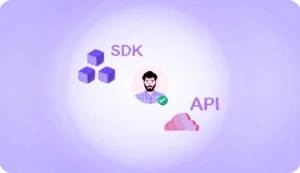When you buy a house, rent an apartment, get insurance, or apply for loans, what’s the one common thing required? Income validation.
But why? Doesn’t everyone know their income? In truth, an income certificate is just one way to verify your financial status—though it isn’t always required for income validation.
An income certificate isn’t mandatory for proving your income, but it often helps in official matters like applying for financial aid, legal transactions, or certain benefits. The certificate itself states your total annual income as recognized by local authorities, making it an official piece of proof when needed.
While an income certificate can make life easier in many situations, its validity is what matters most. A certificate issued by the right authorities, with accurate and updated information, holds weight. That’s where the income certificate validation process comes in.
It’s crucial that the document is legitimate and free from errors, as even minor discrepancies can cause significant delays. Moreover, if the certificate isn’t validated correctly, it can lead to rejections, legal issues, or financial losses.
But how exactly do you show proof of income, and why is it so important? Let’s break it down.
Understanding Income Certificate Validation for Businesses
When you think about businesses needing to validate income, you might picture a bank approving a loan. However, income certificate validation plays a key role in various sectors, from welfare schemes to financial institutions, and understanding this process is crucial for businesses in India.
Let’s explore how income certificate validation works for both individuals and businesses and why it’s important today.
What is Income Certificate Validation?
Income certificate validation is the process of confirming that an income certificate is authentic. This document, issued by authorized entities, verifies a person’s annual income. Businesses like peer-to-peer lending, leasing companies, and credit card firms often rely on this validation to assess financial status.
Traditionally, income verification was done manually. However, digital solutions now make the process much quicker and more accurate, saving time and money.
Income certificate fraud is a growing problem, especially for property managers. In fact, research from 2023 found that 85% of property managers dealt with fraudulently altered income documents. This highlights just how important it is to have reliable income verification systems in place.
So, why do businesses need income verification? Here are a few common scenarios:
- Mortgage companies: They use it to check if an applicant can afford to repay a loan
- Landlords or rental agencies: They rely on income verification to see if tenants can pay rent or security brokerage
- Government bodies: These agencies verify income to determine eligibility for various benefits or programs. For instance, a low-income person may qualify for healthcare subsidies, while a higher-income person might not
- Banks and financial institutions: These organizations validate income when assessing loan applications. The Reserve Bank of India (RBI) mandates that financial institutions verify income before granting personal loans or home loans
Although they don’t always require an income certificate, in all of the above scenarios, validation helps assess the borrower’s ability to repay.
For businesses running welfare programs or offering subsidies, income certificate validation is crucial to targeting the right recipients. For example, the Pradhan Mantri Awas Yojana (PMAY) ensures that only eligible low-income families benefit from the scheme by validating income certificates.
Why is Income Certificate Validation Essential in India?
Income certificate validation has deep legal and procedural significance in India, especially when protecting the rights of disadvantaged groups.
Here’s how it plays a key role in India:
Legal and procedural significance
The validation process ensures compliance with laws governing financial aid and welfare schemes. For example, India’s Income Tax Department requires government authorities to validate income certificates to confirm that the data is accurate. Failure to validate a certificate may lead to fraud, misallocation of funds, and legal issues for businesses involved in these transactions.
Role in socio-economic equity
India’s welfare schemes aim to reduce the socio-economic gap between different groups. Proper income certificate validation ensures that financial aid and subsidies are not misused.
For example, in 2022, the National Housing Bank reported over ₹8,899.52 crore in subsidies allocated to the proper beneficiaries through schemes like PMAY-CLSS. However, the system relies heavily on accurate income validation to prevent false claims from ineligible candidates.
Income Certificates in India: An Overview
An income certificate is a document that confirms your monthly income or that of your family. It includes details like your annual income from different sources, such as salary, rent, pensions, daily earnings, and remittances from abroad. This government-issued certificate is an official proof of income and can help you access various government benefits and subsidies.
The authority responsible for issuing this certificate varies by state. In many areas, it is issued by the Village Tehsildars. However, in other places, it may come from the Deputy Commissioner, District Magistrates, Sub Divisional Magistrates, or District Authorities.
To get an income certificate, you must apply, either online or offline. Along with the application, you’ll provide supporting documents and an affidavit. After reviewing your documents, the government will issue the certificate.
Documents required for income certificate application
To apply for an income certificate, you need to provide specific documents to support your claim. These documents help in document verification and ensure that the application process is smooth. Here’s a list of what you’ll need:
- ID proof: A government-issued ID, like an Aadhaar Card or Voter ID, LPG Card, Passport, Ration Card, or any other official document issued by the Central Government or the relevant state government
- Address proof: A Utility Bill, Passport, Aaddhar Card, Driving License, Pensioner Card with photograph, or Ration Card can serve as proof
- Salary slips: If employed, recent salary slips or income tax returns are required
- Bank statements: In some cases, a recent bank statement may be asked
- Affidavit or self-declaration: Some states may also request an affidavit confirming income details
Once all the required documents are submitted, they undergo verification. After approval, the income certificate is issued.
Read More: The Ultimate Guide To Document Verification [2024]
Steps to apply for an income certificate
The process for applying for an income certificate can vary by location. Here’s a quick guide to help you apply online:
- Visit the official website of your state or district
- Create an account by providing your details
- Generate a unique username and password to access the account
- Log in and select “Apply for Income Certificate.”
- Fill out the application form with details like:
- Name
- Age
- Date of birth
- Gender
- Upload the required documents as instructed on the website
Alternatively, you can apply offline:
- Obtain the application form from the nearest Tahsildar office or download it online
- Fill in the form with your details
- Attach the necessary documents
- Submit the form at the nearest Tahsildar office for processing
While the basic process remains the same, each state may have its own rules. For example, in Uttar Pradesh, income certificates are issued by the District Magistrate’s office, whereas in Delhi, you may apply through the e-District portal.
Always check local guidelines to ensure your application is complete.
Income Certificate Validation Process
One of the most crucial steps after submission is validation. If the authorities don’t correctly validate your documents, it could delay your application or cause rejection.
Key steps in the validation process
The validation process for income certificates is pretty straightforward, but every step counts. Let’s break it down:
- Submission of documents: You begin by submitting your application along with the required documents, such as ID proof, address proof, and salary slips. This is the first and most crucial step. Make sure all documents are correct and up to date
- Verification by authorities: Once submitted, the relevant authorities—usually the local Tehsildar or revenue department—verify the documents. They cross-check income details, tax records, and employment status, ensuring the certificate’s authenticity
- Issuance timeline: After verification, the income certificate is issued. The timeline can vary depending on your location and the workload of the authorities. In some regions, it can take just a few days, while in others, it might take a couple of weeks
Challenges in income certificate validation
As with any system, income certificate validation comes with its own set of challenges. These obstacles can lead to delays or errors that complicate the entire process.
1. Common errors in documentation
A lot can go wrong at the documentation stage. For instance, errors in income figures or mismatched details between documents can result in rejections or delays.
Missing information like tax returns or an incorrect salary slip can cause complications.
2. You may not meet the income requirement
If your income falls below the necessary threshold when applying for a loan or rental, you might need a cosigner. Alternatively, you may need to work on improving your financial standing.
3. Issues in manual validation processes
Despite digital advancements, many regions still rely on manual validation. This increases the risk of human error, lost files, or delays. A recent Experian report highlights that manual processes cause major inefficiencies and increased risks. The slower speed of manual verification drives up operational costs, as property managers waste time on tasks that could easily be automated.
Manual processes can also be time-consuming, especially if the workload is high. Inaccurate record-keeping or misinterpretation of documents often leads to further setbacks.
The good news is that automated document verification tools can now automate tasks like analyzing financial data, verifying employment, and assessing income consistency, all with high accuracy.
Income Certificate Validation vs Income Validation
People often confuse “income certificate validation” with “income validation.” While both are about verifying income, they aren’t quite the same.
Income certificate for income validation
An income certificate is often used to validate income when applying for government schemes or public welfare programs. It helps determine eligibility for benefits like subsidies, loans, or scholarships.
However, income certificates may not meet the requirements of banking or financial institutions. These institutions typically need more detailed documentation, such as salary slips, bank statements, or income tax returns, to assess your loan repayment ability.
Income validation for banking and financial institutions
For banking and financial institutions, income validation typically requires more detailed documentation. Although an income certificate may be helpful, it doesn’t always provide enough information for financial assessments.
Documents like Form 16, which certifies income tax deductions, and Bank Statement Analysis (BSA) are commonly requested. These provide a fuller picture of your financial situation, including tax liabilities, deductions, and other relevant factors.
For loans or credit cards, banks focus on verifying both your income and ability to repay. Therefore, they may require additional documents beyond a basic income certificate.
Role of Technology in Income Validation
More and more property managers are adopting AI-driven solutions, with income verification emerging as a top area of focus. This shift shows growing awareness of how AI can reduce risks in tenant screening.
Take, for example, AI’s impact on Know Your Customer (KYC) processes. A 2023 study by Juniper Research shows that advanced document verification software can cut KYC checks from 2 days to less than 3 minutes. That’s a huge time saver and a massive reduction in operational costs—up to 70%!
AI’s efficiency is also a significant benefit when it comes to staffing. It can process large volumes of documents in minutes, reducing human errors and boosting productivity.

Automatically extract and verify users’ income details in seconds
AI-based Solutions like HyperVerge can accurately verify income for better reasoning through Income Validation. The platform offers a comprehensive suite for effortless income validation with a smooth user experience, including:
- Bank Statement Fetch: It quickly pulls a user’s bank statement through an account aggregator or via PDF upload
- Bank Statement Analysis (BSA): It extracts crucial data from bank statements—like salary details, expenses, transactions, and more
- Document OCR & Validation: This tool extracts and validates data from documents like salary slips, Form 16/16A, and ITR copies
The platform’s AI-powered income validation is not limited to just property managers. It’s used across multiple sectors to enhance operations.
In securities and brokerages, it simplifies the creation of F&O DEMAT accounts. For lending institutions like NBFCs and banks, it speeds up loan underwriting, ensuring faster approvals. In the insurance sector, the platform aids in underwriting coverage and can even help clients receive discounts on their premiums.
Property managers choose HyperVerge for the following reasons:
- For starters, its auto-validation feature accelerates the process by automating income verification for thousands of users, significantly reducing turnaround times
- Additionally, the platform includes automated WhatsApp nudges that quickly re-engage users who may have abandoned the process
- To further improve efficiency, HyperVerge offers an analytics dashboard that allows property managers to track performance in real-time and identify areas where users may be dropping off
This combination of speed, automation, and insightful data makes HyperVerge a smart choice for property managers looking to streamline operations.
Final Thoughts
Is an income certificate the best way to validate your income? While it’s commonly used, there are far easier and more convenient solutions available. Tools like HyperVerge’s AI-powered Income Validation suite offer a faster, more accurate, and more secure way to verify income for property managers.
For busy landlords, using AI-driven solutions increases speed, reduces errors, and prevents fraud. You can instantly assess tenant income, validate documents, and skip the time-consuming manual checks. It’s all automated, so you can focus on what truly matters – providing the best experience for your tenants.
Want to learn more about how HyperVerge can transform your property management? Check out the demo here to get started!
FAQs
1. What is an income certificate, and why is it needed?
An income certificate is an official document that verifies an individual’s or family’s income. It’s required to avail of government benefits, subsidies, loans, scholarships, and other welfare programs.
2. What documents are required for an income certificate application?
Typically, you’ll need proof of identity (Aadhaar card, voter ID), proof of address (utility bills, rent agreements), and income-related documents (salary slips, bank statements, etc.) depending on your state’s requirements.
3. How can I validate my income certificate online?
Income certificate validation can be done through state or district government websites by uploading the required documents and following the verification process set by the authorities.
4. Are there other methods of income validation?
Yes, income validation can also be done through documents like salary slips, tax returns, bank statements, or AI-powered solutions for more efficient and accurate verification.





